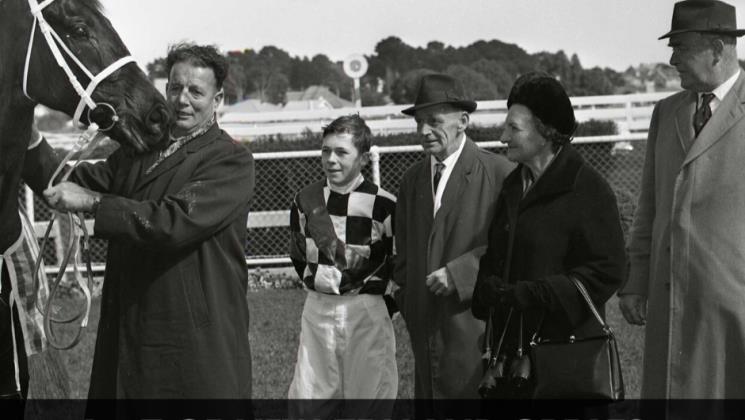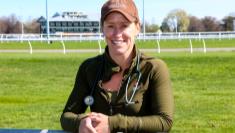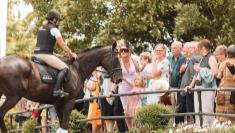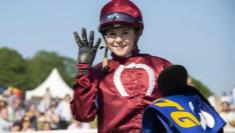
A - Z of New Zealand greats - Quinlivan
Bob Quinlivan knew how to get the best from a good horse.
The Hastings horseman never had a big team but prepared three outstanding gallopers in the 1960s and made them count.
Between them, Game, Picaroon and Empyreus won a remarkable 69 races, most of them in top company.
Picaroon and Game both had lengthy careers and Quinlivan was able to keep them racing and winning season after season.
Picaroon, who won 28 races from 120 starts, won his first race in 1956 and his last in 1964 and won every season from two through to nine, a feat almost matched by Game, a striking black horse, who won 26 races from 80 starts over seven seasons.
Empyreus, who won 15 races, was the top three-year-old and New Zealand’s highest stake earner in the 1964-65 season.
Quinlivan’s legacy also included top rider and trainer Bruce Marsh, who was apprenticed to Quinlivan.
“He [Quinlivan] had very small teams,” Marsh recalled this week. “Eighteen horses would have been a big team, but he never seemed to be without a good horse.
“He was a master at studying horses. He always said you can’t train a horse, till you know the horse. He was an old-school horseman and had all sorts of remedies for various injuries.
“He knew a good horse when he got one. When we first got Game going, he [Game] showed absolutely nothing. We called him Pedro because he was a dozy bugger and always sleeping.
“But Bob said, ‘don’t worry, he will be a beauty’.”
Quinlivan was right and the black horse, who always raced in a white bridle, developed a cult following. Game usually made the pace in his races and his racing style, looks, courage, lengthy career and catchy name combined to make him hugely popular with the public
“Game by name and game by nature” became a common phrase as Game repelled another top-class weight-for-age field, in a career that began in 1965 and ended in 1972.
Marsh, who won a Melbourne Cup and was twice runner-up in the New Zealand premiership in a short career as a rider, was still an apprentice when Game began racing but became the horse’s regular rider and the pair combined for 19 wins. “He was tremendous horse,” Marsh said. “You had to lead on him, so he was always a target [for his rivals] but he had a high cruising speed and loved a fight. That’s why he was so good at weight-for-age.”
Game did not show his best till his five-year-old season but was still able to win as a two-year-old and won the Wanganui and Hawke’s Bay Guineas at three. He rarely failed to give his backers a good run for their money as an older horse, and over his five, six and seven-year-old seasons had 17 wins and 15 placings from 44 starts, before winning twice as an eight-year-old.
He won the weight-for-age Ormond Memorial Gold Cup at Hastings - which later morphed into the Kelt Stakes and Livamol Classic - for three successive years and had two wins apiece in the Awapuni Gold Cup and Jackson Stakes. He also recorded weight-for-age wins in the Stars Travel Stakes at Tauranga, then New Zealand’s richest weight-for-age race, Canterbury Gold Cup, Harcourt Stakes at Trentham and the Thames Valley Stakes at Te Aroha.
Quinlivan made winning the Ormond Memorial an almost annual event in that era, with seven wins between 1960 and 1971. Both Picaroon and Game won the 2000m race three times and Empyreus was successful as a three-year-old.
Empyreus was unplaced in maiden races in his first four starts as a three-year-old but his 17 other starts that season produced 11 wins and four placings, including eight wins from his last 10 starts.
He won the New Zealand St Leger, Great Northern St Leger and Awapuni Stakes and beat the older horses in the George Adams and Anniversary Handicaps at Trentham, Ormond Memorial and Watties Gold Cup at Gisborne.
His George Adams (Thorndon Mile) win over the good horses Rochdale and Tara’s Pride, in a 27-horse field, was probably the high point of his season. “The way he won some of his race was near freakish,” Marsh said.
Empyreus won the Robinson Handicap (1200m) at Foxton with 63.5kg second up as a four-year-old but after four starts at home was tried in Australia. He failed to find his best form in the spring and was transferred to an Australian stable.
He rejoined the Quinlivan stable as a five-year-old but was troubled by foot problems. He never regained his best form, though he won three more races, including the Canterbury Gold Cup, when ridden by Marsh.
Picaroon was renowned for his collection of gold cups. As well as his Ormond Gold Cup treble, he recorded two wins apiece in the Awapuni Gold Cup, Feilding Cup and Hastings Gold Cup, along with wins in the Hawke’s Bay Centennial Cup and Wanganui Cup.
He won an open sprint at Wanganui with 63kg as a nine-year-old and giving the third placegetter 14kg.
“Those cup races were really hard to win in those days,” Marsh said. “They were the equivalent of Group I races. There was no [selling] market for tried horses then and you were taking on the best all the time.”









